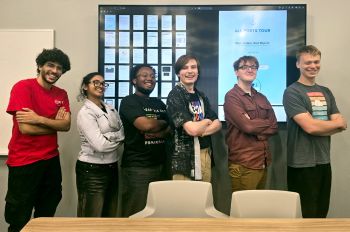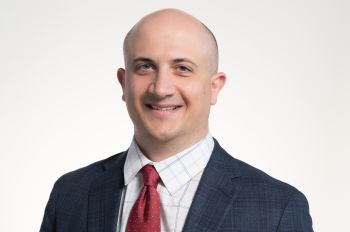College of Computing Professor Secures Funding for Intensive Summer Research Projects

A grant from the National Science Foundation’s Research Experiences for Undergraduates program will allow students from Illinois Institute of Technology, and across the country, to participate in an intensive summer research project.
Yuhan Ding, associate teaching professor of applied mathematics, secured the grant to host 10 undergraduate students on Illinois Tech’s campus who will spend 10 weeks working on computational mathematics and data science research projects this summer.
“Thanks to the support of the College of Computing, we have run the SURE program for the last two years. This contributes a lot to getting this grant,” Ding says. “It’s a great opportunity to have more students at Illinois Tech and show them all that we have to offer here.”
Ding says 10 undergraduate students will be invited to participate in one of three data science and computational mathematics research projects that are currently being conducted by Illinois Tech faculty.
Information on the three projects can be found below.
- Sou-Cheng Choi, research associate professor of applied mathematics, and Fred Hickernell, professor of applied mathematics and Illinois Tech’s vice provost for research, are exploring “speedier simulations” to develop and implement algorithms in an open source Python package called, QMCPy that speeds up Monte Carlo simulations. Students will contribute to QMCPy by exploring new use cases, by implementing new algorithms, and/or by improving performance through parallel processing.
- Students working with Shuwang Li, professor of applied mathematics, will examine crystal growth as a classic example of a phase transformation from the liquid phase to the solid phase via heat transfer. In “From the Formation of Snowflakes to Crystal Growth,” students will learn the underlying physics of snowflake formation and evolution, particularly the general concepts of mathematical modeling and hands-on scientific computing.
- In “Learning and Modeling Collective Behaviors,” led by Yubin Lu, postdoctoral researcher, and Ming Zhong, assistant professor of applied mathematics, students will learn how to model collective behaviors with the help of proper machine-learning tools and possibly validate the learning method on experimental data. Collective behaviors, or self-organization, can be explained by using dynamical systems, and yet they present a challenging task to model properly using mathematics.
“This is a great way for undergraduates to gain hands-on research experience,” Ding says. “They will gain knowledge to write scientific papers, learn programming skills, and encourage them to pursue higher degrees in STEM.”
NSF funds a large number of research opportunities for undergraduate students through its REU Sites program. An REU Site consists of a group of 10 or so undergraduates who work in the research programs of the host institution. Each student is associated with a specific research project where they work closely with the faculty and other researchers. Students are granted stipends and, in many cases, assistance with housing and travel.
Disclaimer: “Research reported in this publication is supported by the National Science Foundation. This content is solely the responsibility of the authors and does not necessarily represent the official views of the National Science Foundation.”
Photo: Yuhan Ding (provided)




